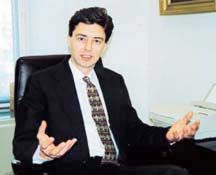|
Autumn 1998 (6.3)  First Days An Interview with John Hoholick, Exxon's Technology Manager who was Exxon's Founding Manager in Baku
Exxon was
one of the latecomers to join the AIOC (Azerbaijan International
Operating Company) consortium. Ten international foreign companies
originally signed the contract in 1994. Only Japan (ITOCHU) joined
later than Exxon. Why did Exxon join so late? Seriously though, we had the chance to purchase part of the share owned by SOCAR (State Oil Company of Azerbaijan), and we took it. After the signing of the "Contract of the Century" (as the Azerbaijanis like to refer to), SOCAR made 10 percent of their share available. From our technical assessment of the structure, we knew that it had potential. Also, this reservoir was already known and had been proven so there was no exploration drilling risk associated with it. Originally, we acquired 5 percent of SOCAR's interest. When Pennzoil decided to sell a portion of its interest, we ended up with about 3 percent of their share, which gave us a total of 8 percent. How did Exxon
get involved in the Caspian in the first place? Is Exxon
involved with other Caspian countries? Exxon also
has another Azerbaijan project - the Nakhchivan prospect. What's
happening there right now? Exxon has
been involved in many community projects, especially ones with
an emphasis on youth and education. I received tremendous support from the Exxon management for education projects. We wanted to be recognized for something that would have a positive impact on the future of Azerbaijan. It's one thing to put on concerts or dinners, but we wanted a long-term focus. Education seemed to be the right answer. One of Exxon's
most significant projects has been the sponsorship of the new
Azerbaijani-English dictionary. The first copies of the Latin
text version just came out in mid-June. What was Exxon's role
in this project? Betty Blair from Azerbaijan International put us in touch with Oruj Musayev at the Institute of Foreign Languages. He had compiled a dictionary that translates directly between Azeri and English, meaning that no longer would Azerbaijanis have to learn Russian to acquire English. We sponsored the first publication, which was the Azeri-English dictionary in the Cyrillic script [June 1996]. But we couldn't let Musayev stop there because the real need was for the Latin version. We provided him with a personal computer, and he spent the next year revising the dictionary and converting the terms to the Latin alphabet. Regardless of what happens with the oil, the economy or the political situation here, that dictionary is always going to be here for the people of Azerbaijan. We're proud of that! We also want to put together a Azeri Latin Spell Check for computer usage and make it available on CD ROM disk. That way, words can be spelled correctly and consistently. We already have the dictionary in a database, so hopefully this will be a simple step. In addition, we are sponsoring the publication of an Azerbaijani encyclopedia for children so that they can study their own national history, traditions and science in the new alphabet. You also
were quite involved with establishing AmCham (American Chamber
of Commerce) in Azerbaijan. So we started generating support and, slowly but surely, we eventually managed to recruit a small group. Now, as more and more people come into Azerbaijan, they're joining, too. I think getting AmCham started here was the most fun, yet the most frustrating and challenging, project I've ever been involved with. Now you have
a beautiful office in the Landmark Building, having leased the
entire third floor. What was it like when you first arrived with
your suitcase in Baku and had to go about finding a place for
an office? Azerbaijan
as a former Soviet Republic is going through a tremendous transition
- both economically and psychologically. You've been here throughout
this process. What has it been like? How have
you found working with Azerbaijanis? From the
point of view of doing business in Azerbaijan, what advice would
you give expatriates coming to Azerbaijan? Sure, some things have been difficult for us. When I came here, electricity was very unpredictable. We would have it for half an hour, maybe six hours, maybe even two days and then blackout! At first, it was frustrating, but then we got used to it. When we had electricity, we worked, we did our printing and so on. We knew we might not have the next hour. That made it tough to start a new business. A lot of these things have changed now and become more stabilized. The situation today is much improved and our office can operate much more efficiently. When newcomers ask me how to set up an office, I always tell them two things: first, get yourself a good accounting firm, and second, buy a cellular phone. Those are the two most important things you'll need to do business here. But despite the frustrations and disappointments from time to time, the one thing that has made all of the problems insignificant has been the hospitality of the Azerbaijani people. I have never felt more welcomed in any country in my life than here. From the drivers we work with, to the staff that was hired, to the people I've met, everyone has made me feel at home. I've been invited to many homes. I've met with many families, and always I've felt a very welcoming atmosphere. Regardless of what happens, I know that if I ever needed help, it would be there for me. I hope this spirit of hospitality lasts forever here in Azerbaijan. From Azerbaijan International (6.3) Autumn 1998. |

